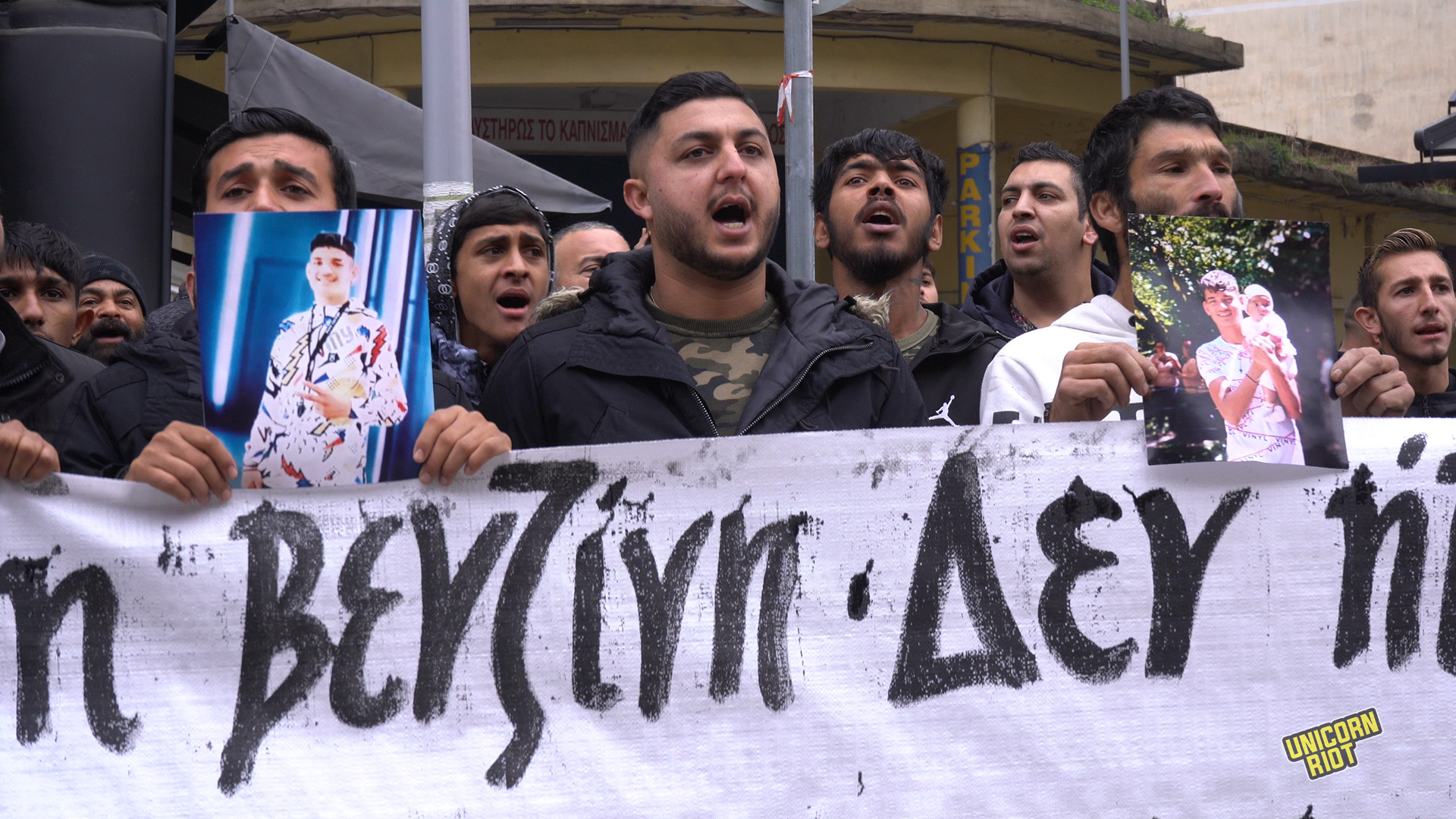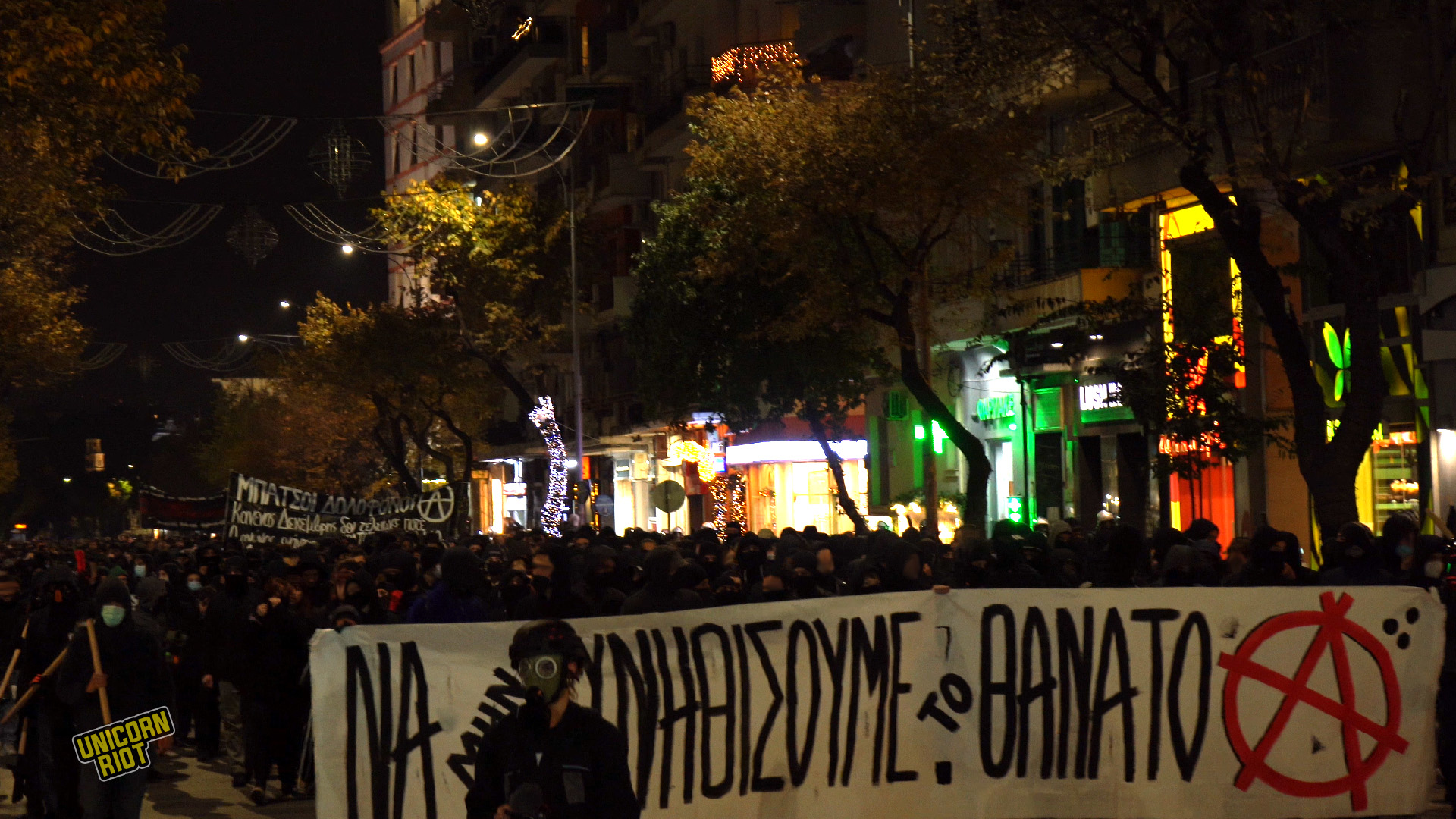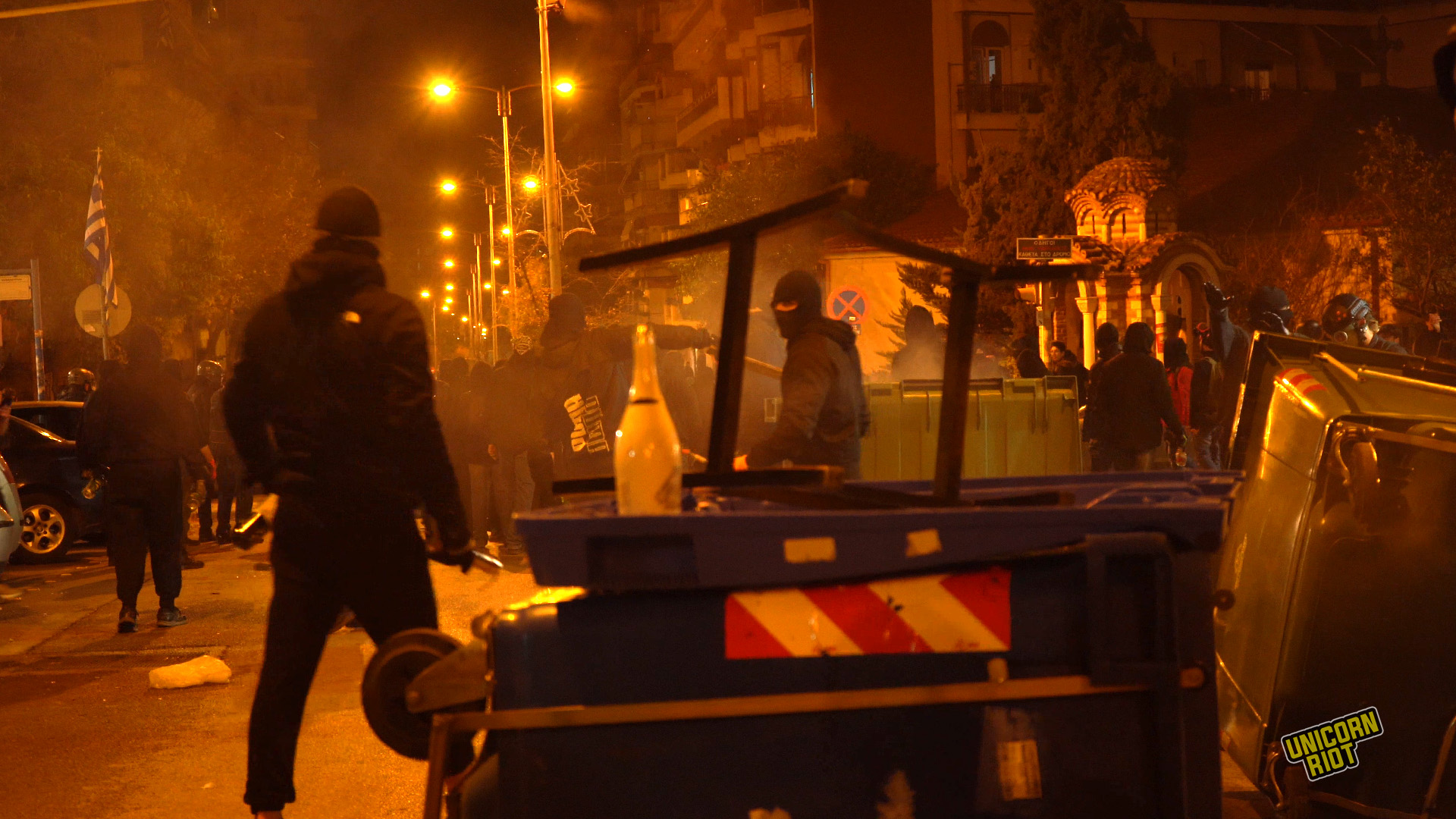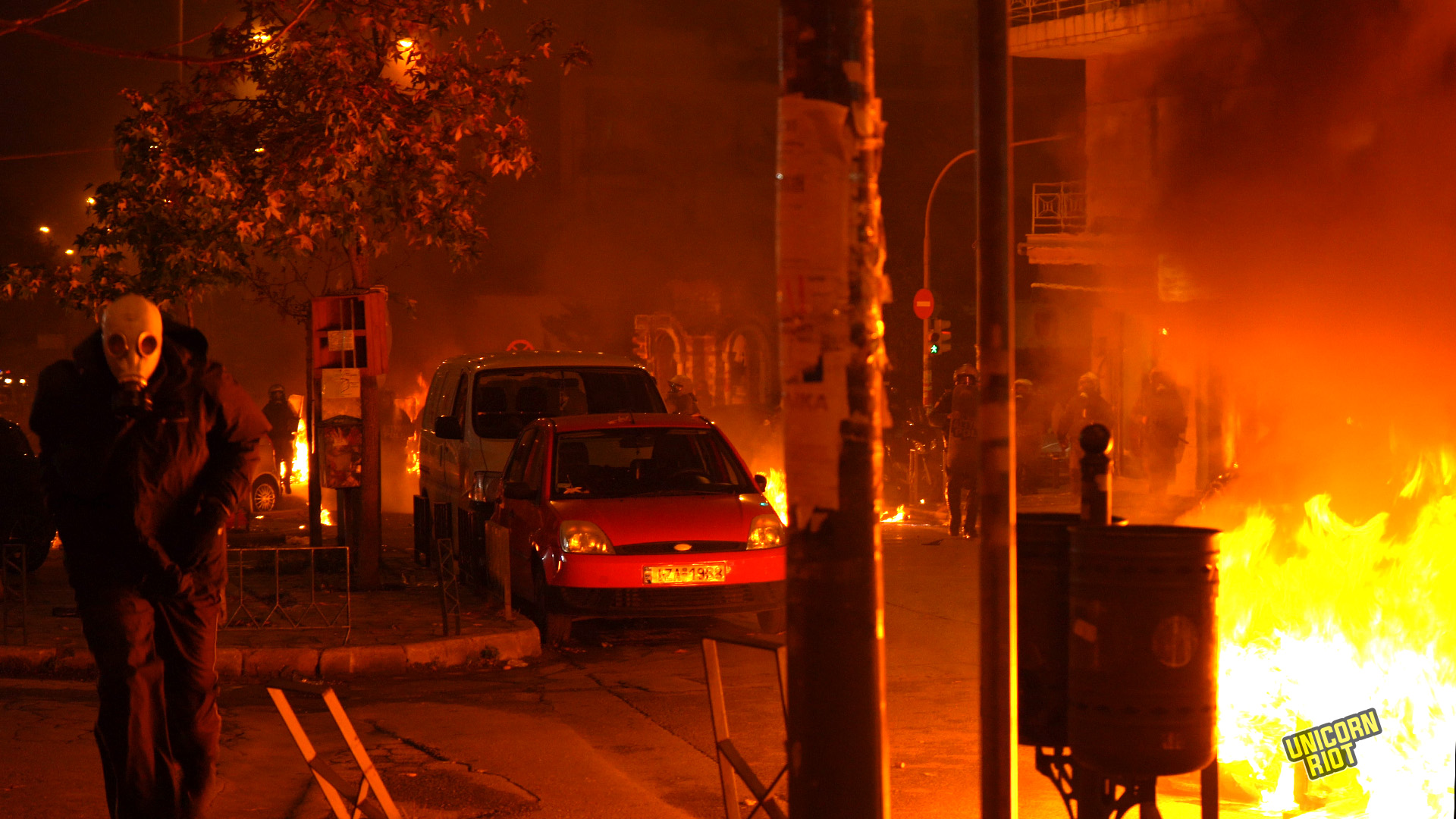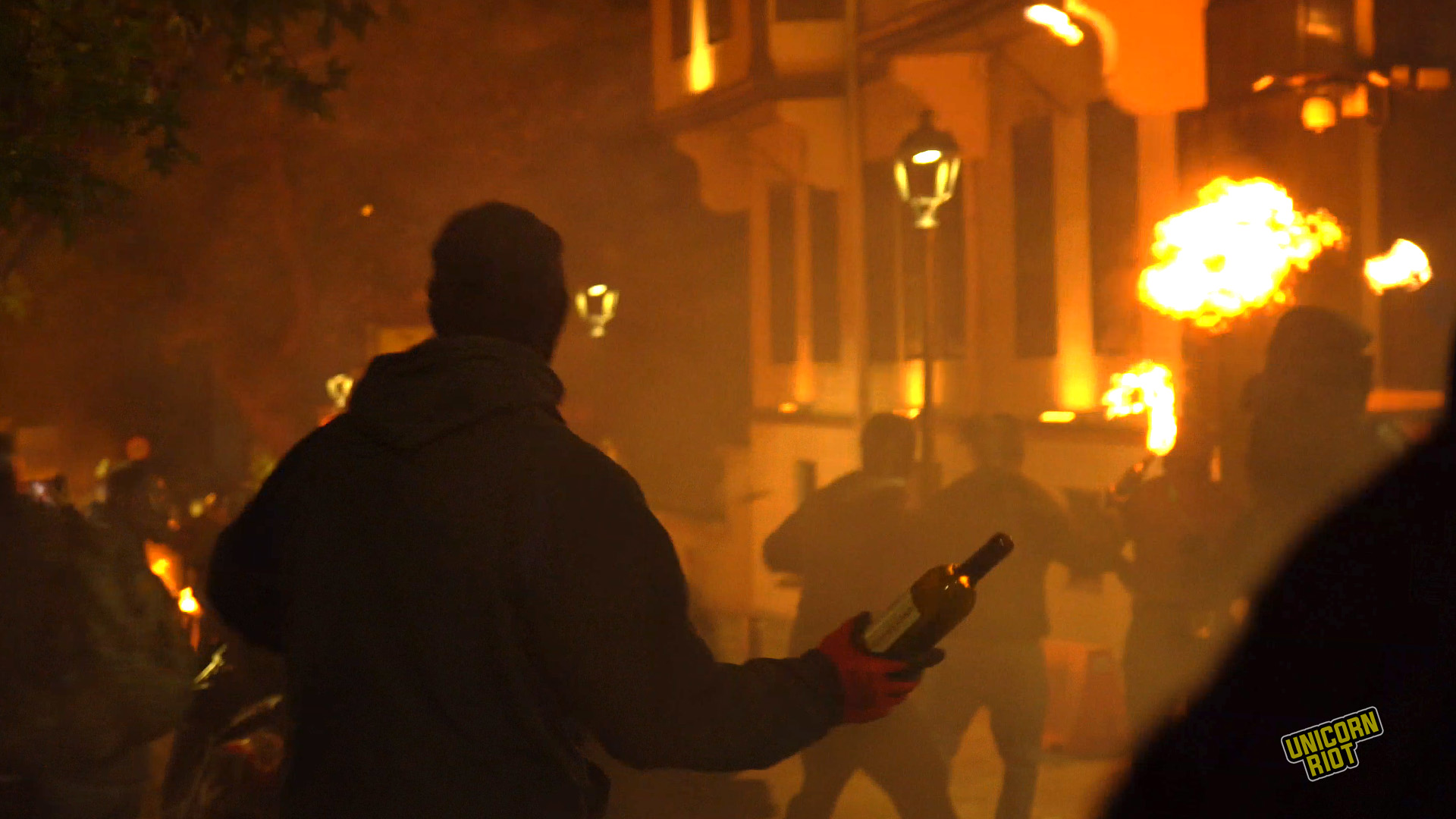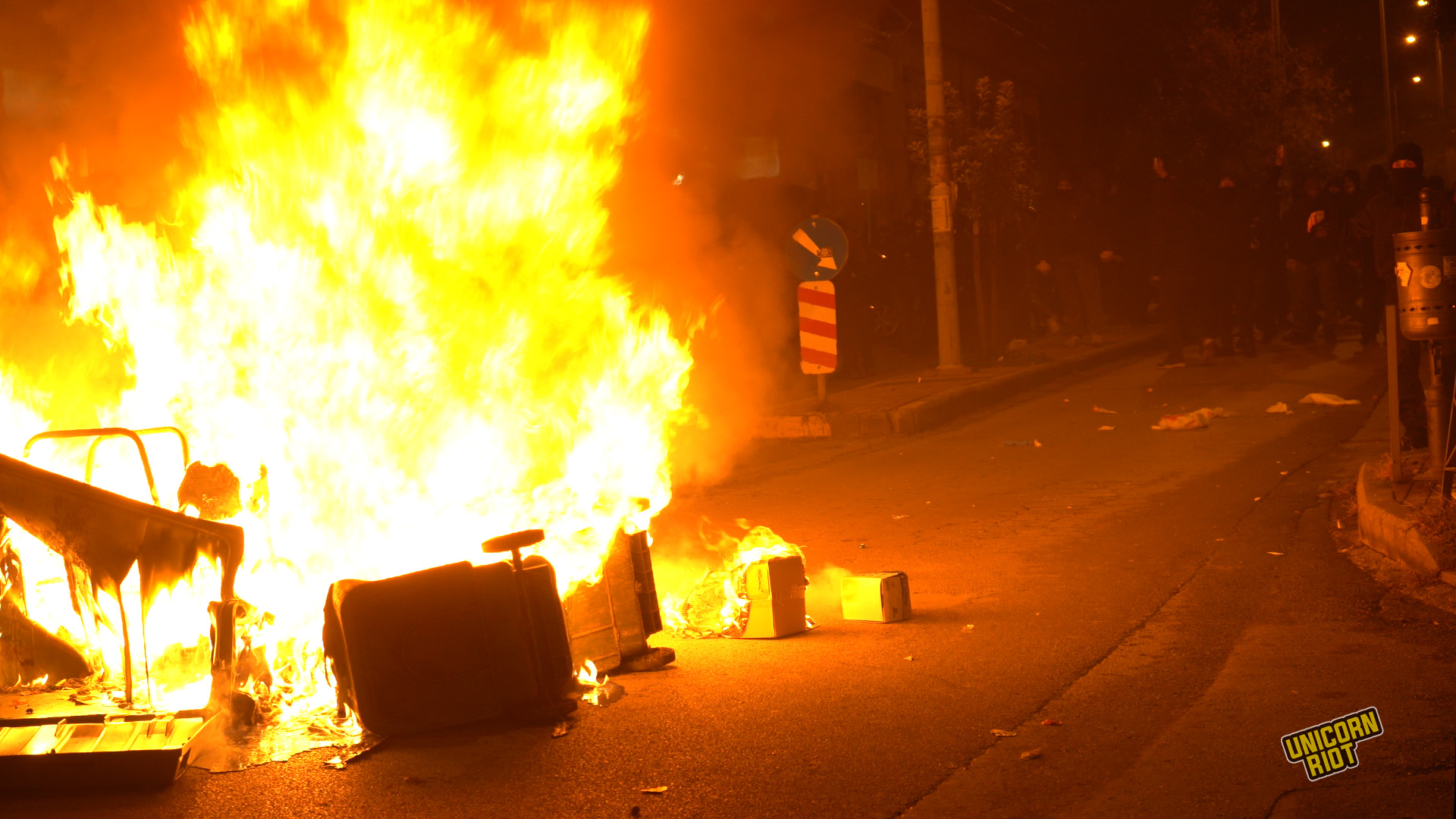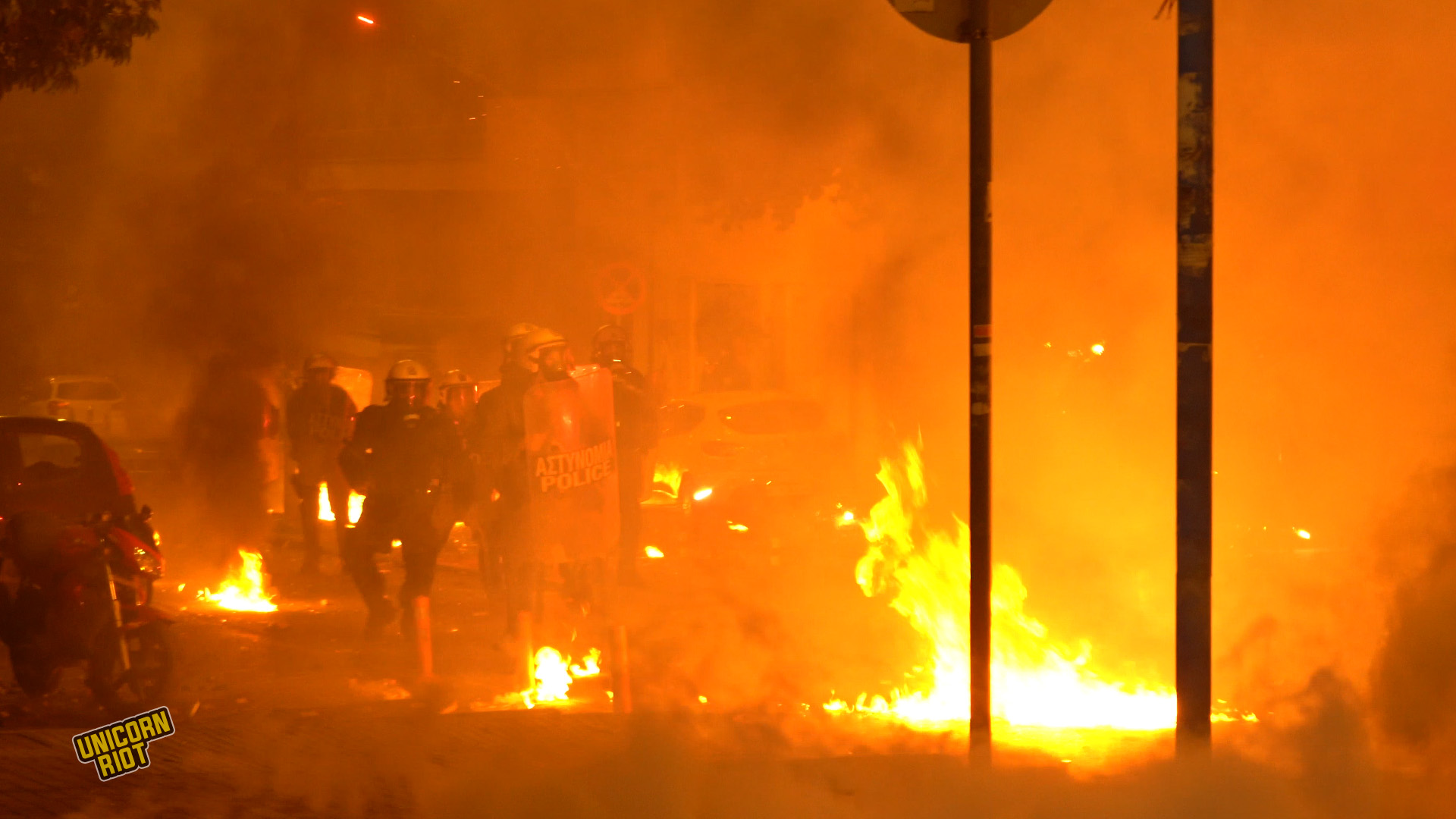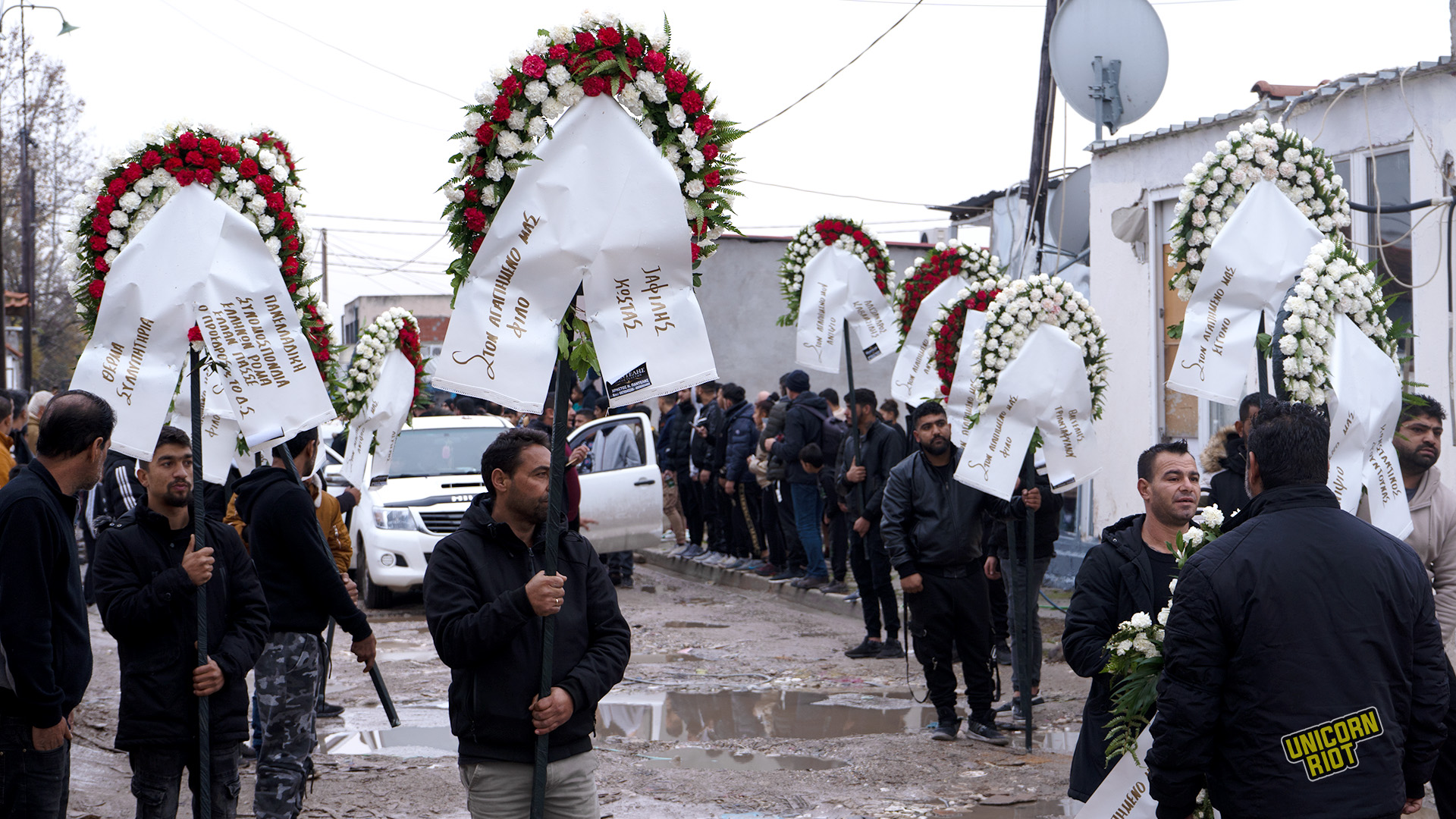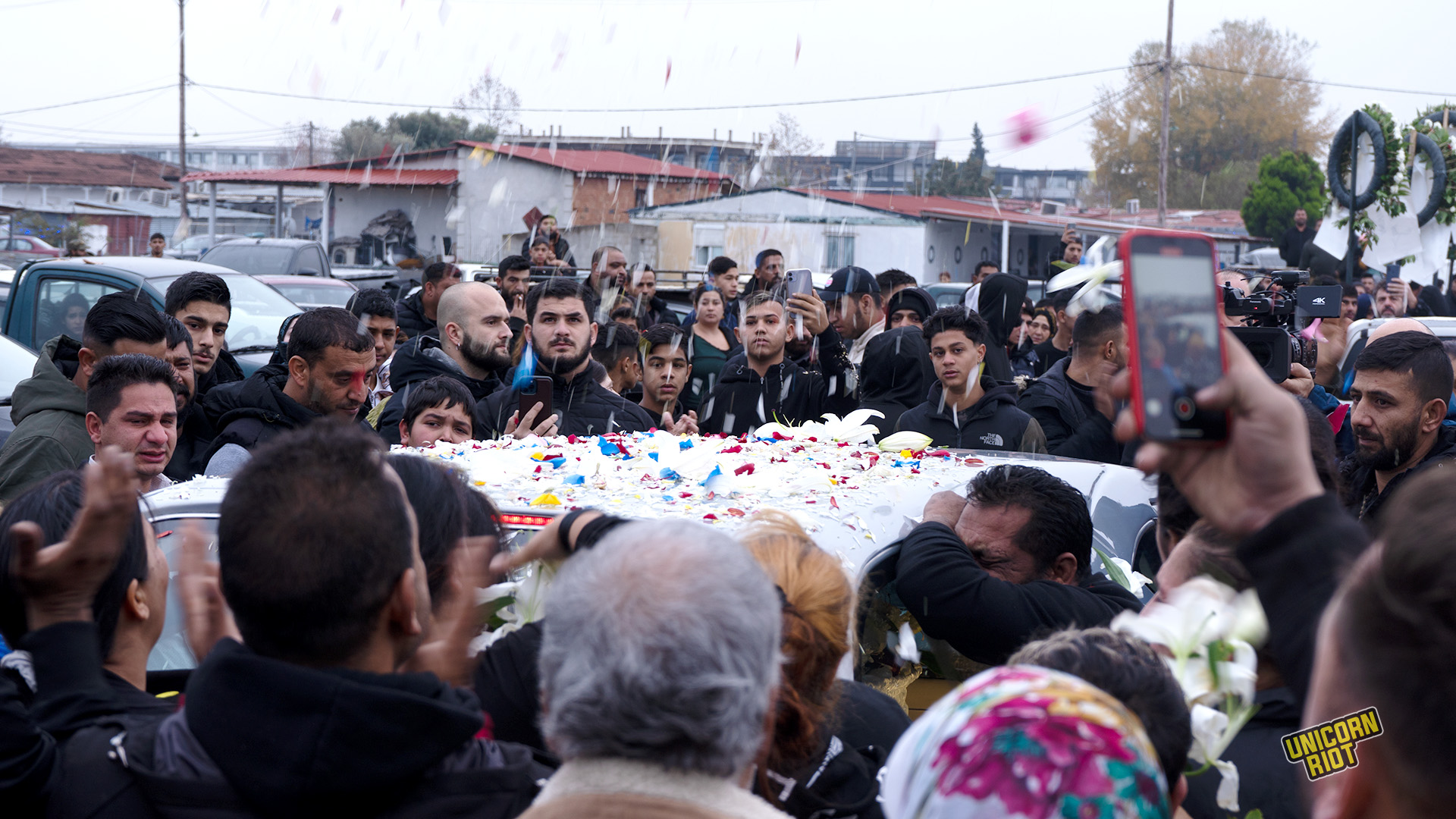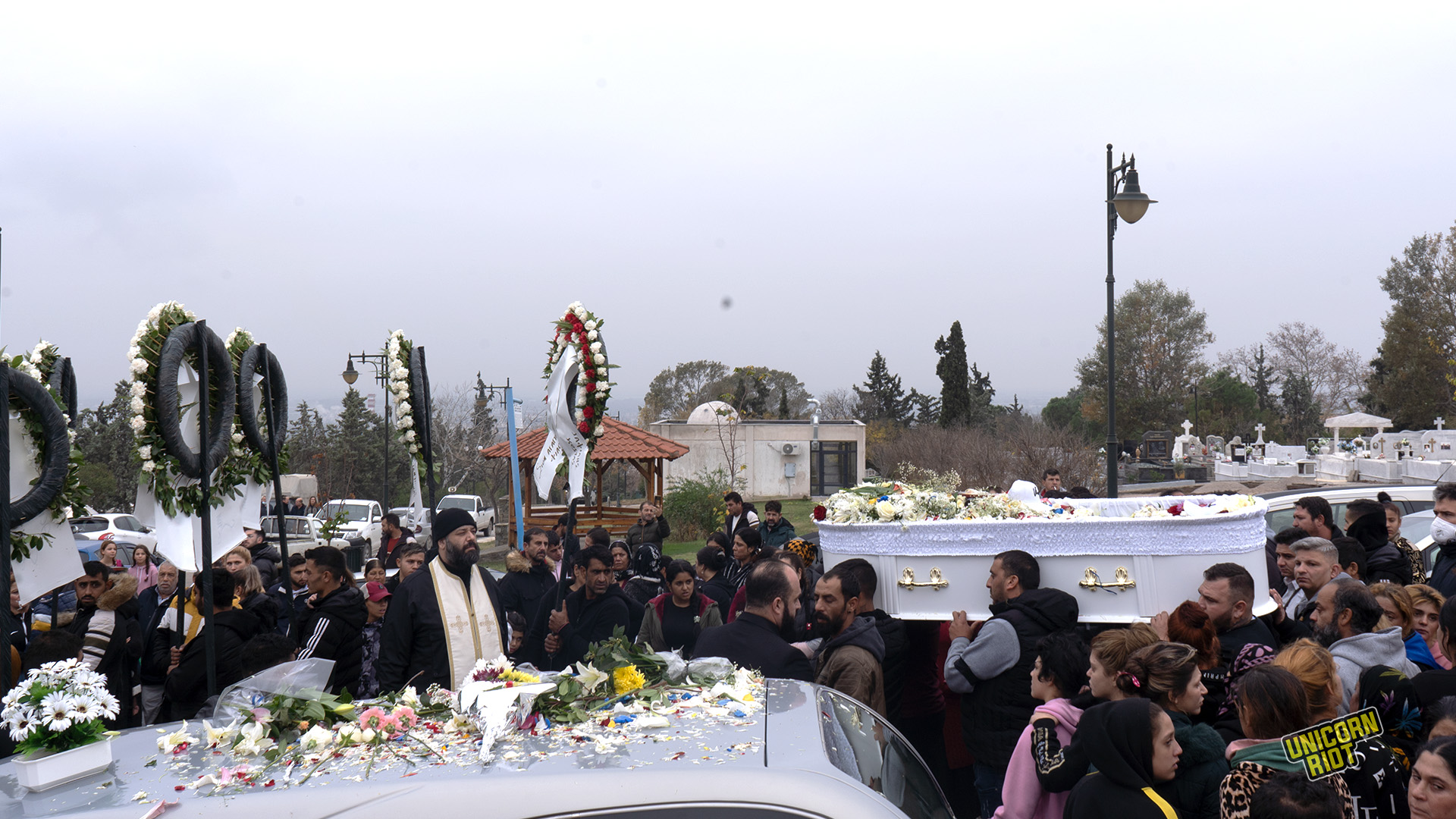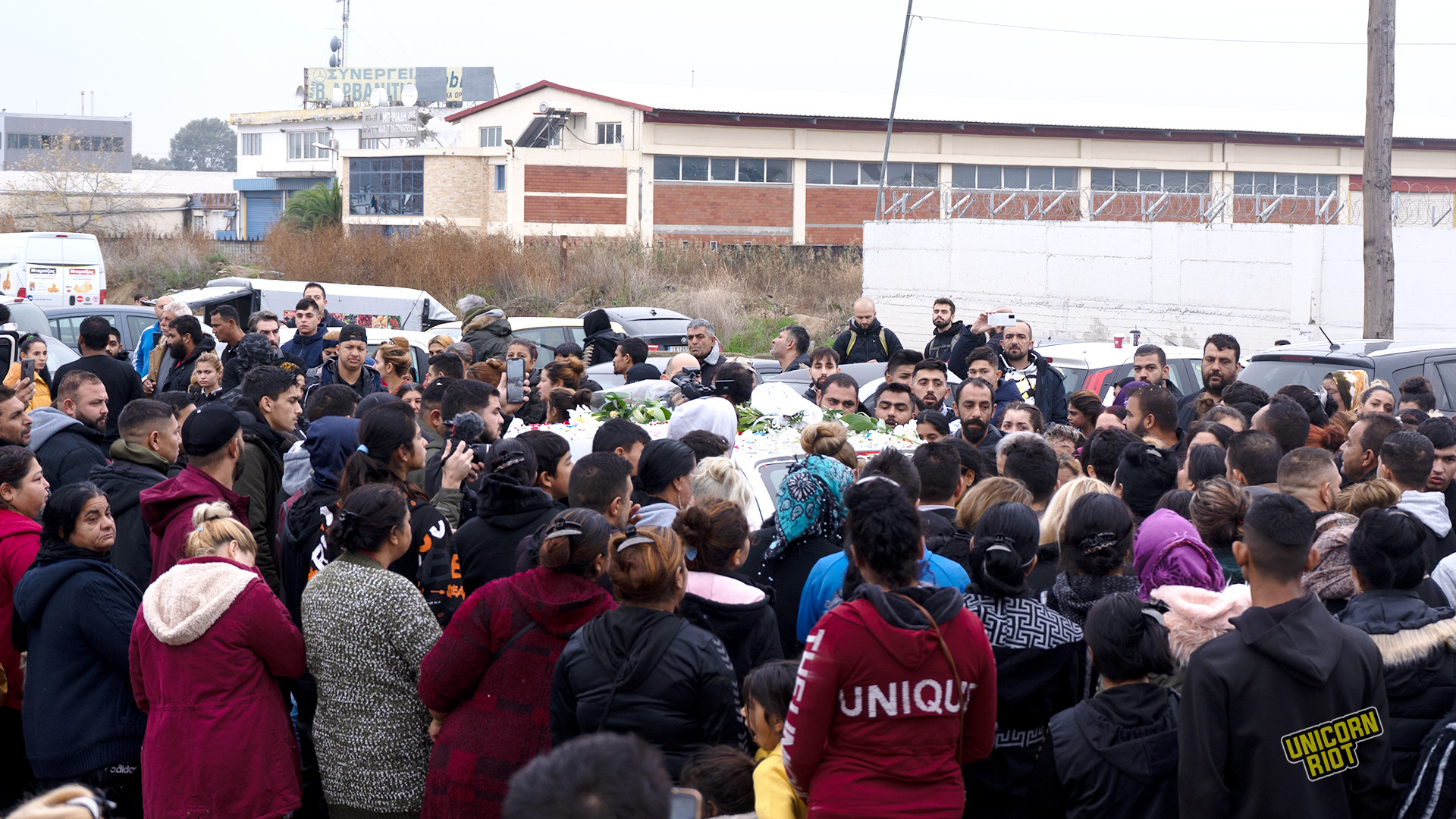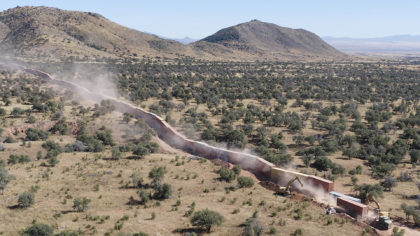Tensions Explode in Greece After Police Kill Roma Teen One Day Before 14th Anniversary of Past Police Killing
Thessaloniki, Greece – In a few-day span from Dec. 5 to Dec. 9, fiery protests took hold in several cities in Greece as communities across the country responded to police shooting another Roma youth on the eve of the anniversary of the Dec. 6, 2008 police killing of Alexis Grigoropoulos. Sixteen-year-old Kostas Fragoulis was shot in the back of the head by Greek police in Thessaloniki on Dec. 5. Fragoulis was pronounced dead eight days later on Dec. 13.
Unlike the United States where nearly 1,000 people are killed by police each year, police killings in Greece are a rare occurrence. The most notable was fourteen years ago when police killed 15-year-old Alexis Grigoropoulos in Exarcheia, Athens in 2008. The murder led to a massive uprising that lasted for weeks and led to large-scale destruction. Thousands of Greeks commemorate the killing every year by taking to the streets on Dec. 6 as they did this year.
There hadn’t been any other police killings in Greece since Alexis, until last year when police killed 18-year-old Nikos Sampanis. And now this year, Kostas Fragoulis was killed. Both Sampanis and Fragoulis were Roma teenagers.
In both cases, the police fired direct shots during unnecessary car chases of citizens who had not committed serious crimes. Sampanis and his friends were allegedly in a stolen car and Fragoulis is said to have driven off without paying for twenty euros worth of gas. In both cases the police knew they were after young people of Roma origin. Instead of ignoring the commands of the headquarters like in the case of Sampanis, the police informed the headquarters a half hour later, that there had been a shooting in the case of Kostas Fragoulis.
Greek Police Shoot Kostas Fragoulis – December 5, 2022
Shortly after 1 a.m. on Dec. 5, in the Diavata area of Thessaloniki, in Northern Greece, Kostas Fragoulis, 16, of Roma origin, was shot in the back of the head by a DIAS unit motorbike police officer while driving his pickup truck. Although seriously injured, Fragoulis is said to have initially survived, in critical condition.
The incident unfolded after Fragoulis was alleged to have left a nearby gas station without paying for 20 euros worth of petrol.
Security camera footage from the gas station showed the police who were involved in the shooting were drinking beers in the store before being informed of the vehicle leaving without paying for gas by the store’s owner.
The policemen chased the young driver from the gas station. Nearly 500 meters before the boundaries of the Roma settlement where Kostas lived, they shot him. It is not known whether Fragoulis’ vehicle hit a wall before or after the shooting, however he was taken to hospital in serious condition where he was immediately operated on.
The initial police reports about the incident were vague, mentioning that Fragoulis was severely injured because of a car crash resulting from the police pursuit.
“The vehicle was followed by the aforementioned police officers using light and sound signals, making continuous dangerous maneuvers for the rest of the road users and non-compliant, it headed towards the area of Diavati. Repeatedly violating traffic lights and constantly performing dangerous maneuvers, he tried to ram the advancing two-wheeler of the DIAS Team head-on, putting the lives of the police officers in immediate danger, once again ignoring their orders. In view of the immediate danger, the police officers used a weapon (firing two shots) in an attempt to stop the vehicle, as a result of which the driver lost control of it, hitting a wall.”
Police statement
By the morning time, a large number of friends and relatives of Fragoulis gathered outside the hospital in support.
A few hours later, the crowds at the hospital responded to news that a police unit had appeared outside and the crowds converged on the unit and clashed with the police forces. After tossing tear gas at the crowd, police units were forced to withdraw.
That same evening, clashes ranging from small to large broke out in Roma camps mainly around Thessaloniki but also in other areas of northern Greece. Violent clashes also broke out in the center of Thessaloniki, where people gathered to protest the police violence.
Clashes errupted yesterday in #Thessaloniki between the police and protesters for the murderous police attack on the Roma teenager Kostas Fragoulis. They shot him on the head during a car chase.#16χρονος #θεσσαλονικη #ΕΛΑΣ #antireport pic.twitter.com/zgD3MJXDCE
— the brake (@TheBrakeNet) December 6, 2022
Hospital Clashes and Anniversary of Police Killing Alexis – December 6, 2022
Dec. 6 is the anniversary of the murder of the 15-year-old Alexis Grigoropoulos in 2008, a day with heavy anti-police significance across the country. The shooting led to massive riots and a prolonged uprising for weeks throughout Greece. On the 10 year anniversary in 2018, Unicorn Riot documented from the frontline of intense street fighting.
Epamidondas Korkoneas, an ex-special police guard of the Greek police, was the shooter of Alexis and was given a life sentence. After serving just over 10 years, Korkoneas had his sentence overturned and was released from prison.
The police officer who shot Fragoulis had to make a statement at the prosecutor’s office and outside the courts there was a gathering of Roma people and a few solidarity groups.
In a short time, confrontations turned into small-scale clashes between protesters and police. During the confrontations, the police beat and almost arrested the father of Kostas Fragoulis.
The 34-year-old policeman who shot 16-year-old Kostas Fragoulis, was taken to the #Thessaloniki court early this morning. He requested and received a deadline to apologize on Friday morning before the first regular prosecutor.#16χρονος #16χρονος_θεσσαλονίκη #antireport pic.twitter.com/kdbUg1V2ox
— the brake (@TheBrakeNet) December 6, 2022
The shooting of Fragoulis added fuel to the fire for the evening’s Dec. 6 anniversary march. At least 10,000 civilians took part in a massive march through the center of Thessaloniki, one of the largest in recent years.
At the end of the march, hundreds erected barricades and threw Molotov cocktails, homemade projectiles, fireworks and flares at the police. Police detained 15 people, but no arrests were made.
Throughout Greece the commemoration marches gathered large numbers of demonstrators and cities such as Athens, Larissa and Ioannina experienced riots.
Countrywide Roma Protests and the Reaction of the Police
The most significant and unprecedented thing was the partly coordinated revolt in numerous Roma settlements and neighborhoods throughout Greece – in more than 10 different regions. Social media played a role in the coordination. Because Roma communities across Greece use TikTok on a large scale to communicate, the message of the police killing Kostas Fragoulis spread far and wide, turning into a campaign for justice.
The Roma came out on the main roads or just outside their communities, lit fires and barricades, and clashed with the police. They demanded justice and the conviction of the police officer who shot Fragoulis.
Through slogans such as “It wasn’t about the gas money, they killed him because he was a Roma,” they denounced the systematic racism that Roma people experience.
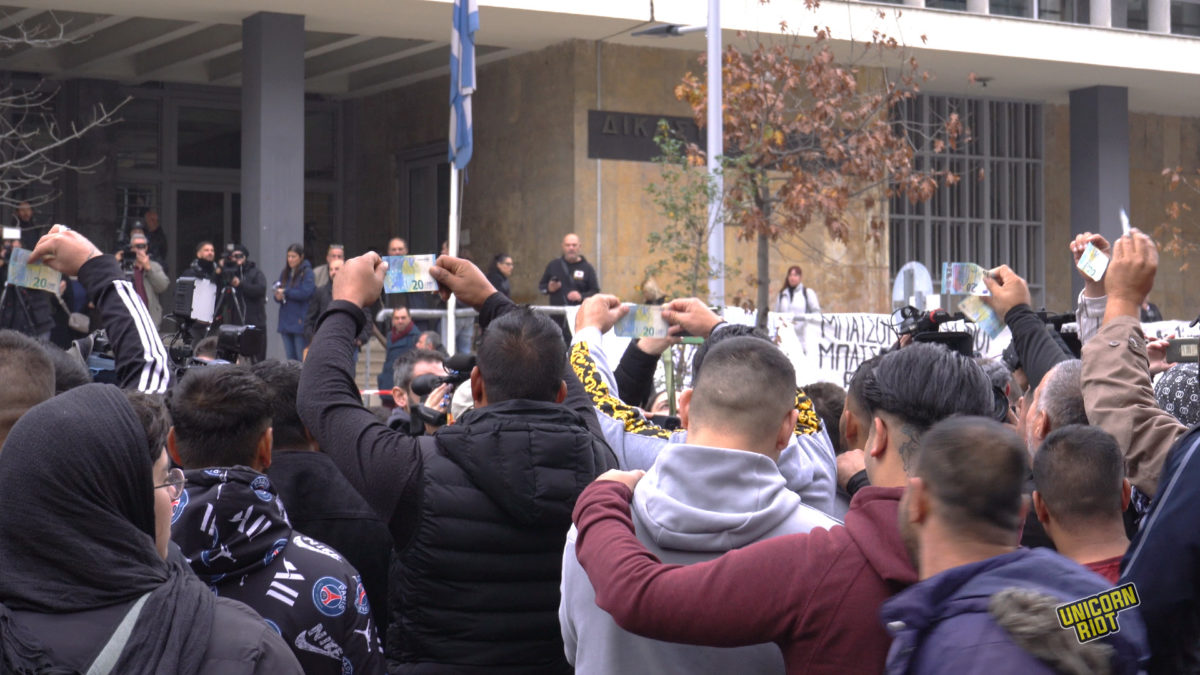
Two days later, the police violently crushed the Roma uprising, taking suppressive actions on whole regions. The large-scale military-style police operations lasted a week from Dec. 8 to the fourteenth and were coordinated through the whole country, militarizing the management of dissident communities. Special police forces invaded settlements, camps and neighborhoods of Roma communities.
The narrative being told to the Greek public by the police and media blamed Fragoulis for his killing saying officers feared for their lives and blamed “criminal” Roma elements for the invasive raids.
The subsequent raids victimized whole Roma communities and were widely reported as being successful in finding drugs and guns. Yet, the realities of the raids were different than the media concocted, only a few shotguns were found and just a small amount of marijuana, both illegal in Greece. While there are no official numbers detailing the total number of people detained from the raids, dozens are expected to have been arrested throughout the country and none are officially facing charges from the justice for Kostas Fragoulis protests.
The arrests were mostly for petty crimes such as stealing electricity and cars not being in proper condition to be driven around.
Despite the raids not netting the big criminals they were looking for, the police violence served as their reaction to the uprisings. Several reports and dozens of videos circulated across the internet showing images of severe beatings within communities by police along with heavy use of tear gas.
Related Coverage
- Athens Prepares for 10th Anniversary of Teenager’s Death by Police [2018]
- Major Clashes Mark 10 Years Since Greek Police Killing of 15 Year Old Alexis [2018]
- Life Sentence Overturned for Greek Police Officer that Killed Teenager [2019]
- Greek Police Occupy and Desecrate Memorial Site of Teen They Killed [2020]
- Greek Police Kill Teenager (Nikos Sampanis) as Racism, Violence Against Roma People Spikes [2022]
- Roma in Greece Face a History of Exclusion, Exploitation and Racism [2022]
- Calls for Justice for Nikos Sampanis Renewed [2022]
- Police use Private Database to ID & Racially Profile Roma in US [2022]
Accusations of Hospital-State Coverup, Fragoulis Dies, Police Activated
After the shooting, the doctor’s union at the hospital that Fragoulis was a patient at, directly accused the management of withholding information about the health condition of Fragoulis to his family.
News circulated across communities in Greece that the state was covering up Fragoulis’ death, seemingly with the help of hospital management who claimed Fragoulis was alive. This led to speculation of the possibility that the 16-year-old was clinically dead moments after he was shot and was just held on life support to quell civil unrest.
“When there is an official police statement that only mentions the attempted ramming of a machine and does not mention the reason and the fact that this child was injured as a result of a gunshot, this is a cover-up (…) our thoughts are with Kosta. We are all waiting for a miracle,” the lawyer, Theofilos Alexopoulos said.
On Dec. 13, a week after he was shot by police, Kostas Fragoulis was announced dead.
On the same day, the Commander-in-Chief of the Greek police announced that he was putting the entire force on alert throughout Greece. In Athens and Thessaloniki the streets were filled with police units of all kinds.
Authorities kept a tight grip on the protesters during the marches on Dec. 13 and made many arrests of protesters afterwards.
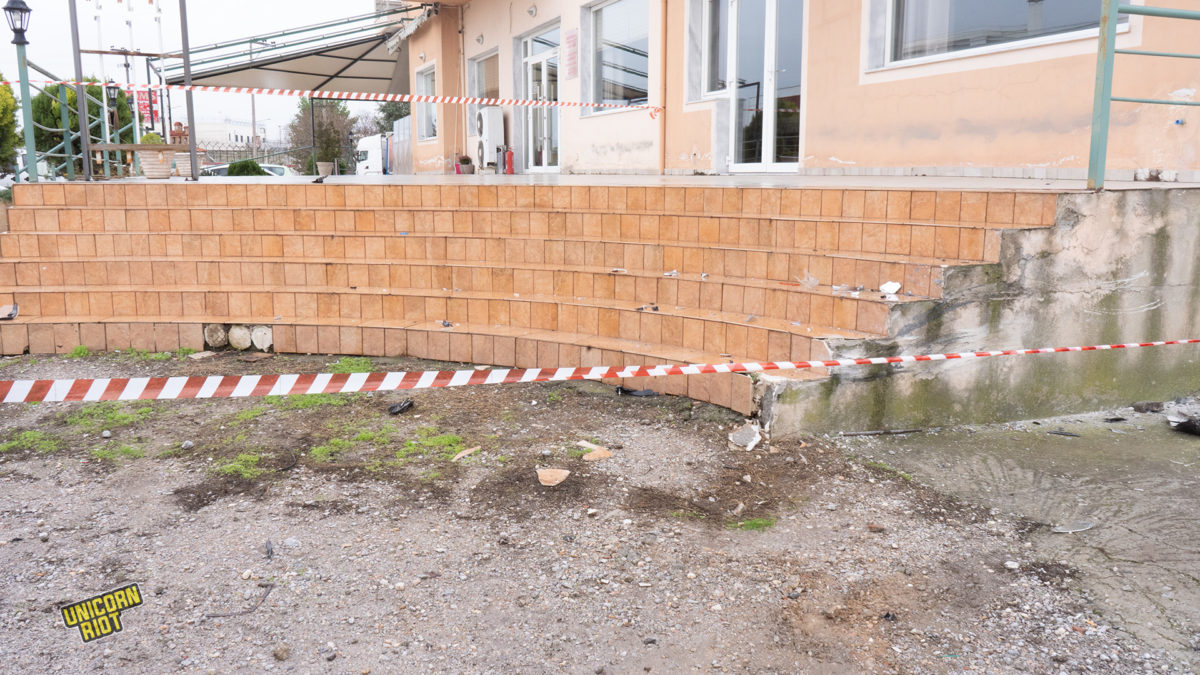
Unnamed Officer Charged, Courthouse Protests and Funeral of Kostas
In Greece, they typically do not name the officers who take part in violent acts against the community. The name of the officer who killed Fragoulis has not been released but as of Dec. 13 he’s been charged with manslaughter with possible malice aforethought. He faces a prison sentence of 10 to 25 years if he’s convicted.
On Dec. 9, three-plus days after the shooting, the officer involved made his statement. He claimed that he was forced to shoot because the pickup truck driven by Fragoulis, which was allegedly between the two police motorbikes, tried to ram the front bike.
During the hearing, the investigator and the prosecutor disagreed on the question of his pre-trial detention, as the latter recommended he be sent to prison. The Thessaloniki Plenary Council resolved that disagreement on Dec. 19 when they ruled the officer would not be jailed as he awaited trial. He was on house arrest and ordered not to leave the country before the ruling and was taken off house arrest after the hearing.
Fragoulis’ father, who was nearly arrested outside the courthouse by riot police, said all he wants is justice. He said he wants to see the officer “punished and put away” and said Kostas “was the best kid, even though he did what he did, we apologize.”
The Thessaloniki courthouse was one of the main points of mobilizations and protests of the family, friends and the community of the settlement where Kostas Fragoulis was living.
People gathered there for days demanding justice from a system that has routinely failed the Roma people. No police officer has been jailed in Greece for any misconduct against Roma people. While on the other hand, Greece has been convicted several times in the European Union courts for violations of the rights of the Roma communities [1, 2, 3].
On Dec. 15, a large number of relatives and friends gathered to say the last goodbye to Kostas Fragoulis during his funeral. A large car parade started from the settlement Agia Sofia, where Kostas lived, passed by the location where he was killed and continued all the way to the cemetery.
The trial date for the officer who killed Fragoulis is yet to be scheduled.
Niko Georgiades of Unicorn Riot contributed to this report.
For more media from Greece, see our Greece archive page.
Follow us on X (aka Twitter), Facebook, YouTube, Vimeo, Instagram, Mastodon, Threads, BlueSky and Patreon.
Please consider a tax-deductible donation to help sustain our horizontally-organized, non-profit media organization:

